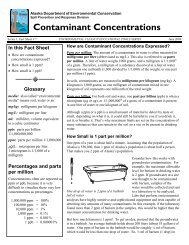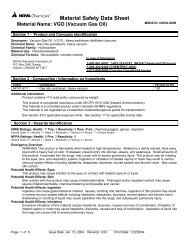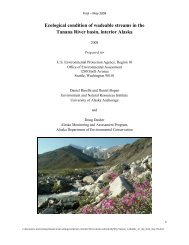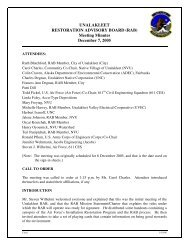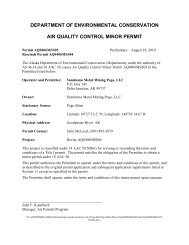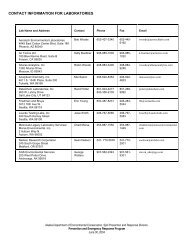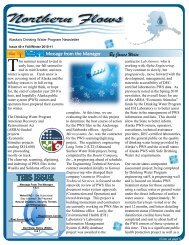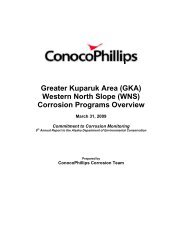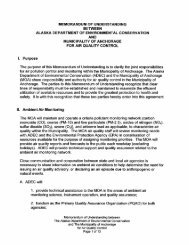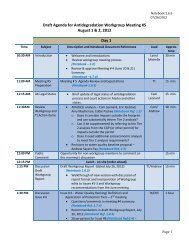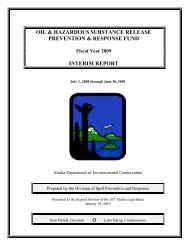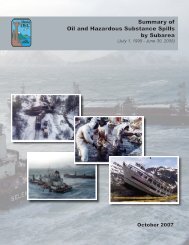2012 Ocean Ranger Guidebook Revision 3-7-12 - Alaska ...
2012 Ocean Ranger Guidebook Revision 3-7-12 - Alaska ...
2012 Ocean Ranger Guidebook Revision 3-7-12 - Alaska ...
Create successful ePaper yourself
Turn your PDF publications into a flip-book with our unique Google optimized e-Paper software.
<strong>20<strong>12</strong></strong> <strong>Ocean</strong> <strong>Ranger</strong> <strong>Guidebook</strong> 3-7-<strong>12</strong><br />
Text: Marine casualty (such as loss of propulsion, steering, or associated control system that reduced<br />
maneuverability of vessel, grounding, significant harm to the environment, loss of life of serious injury,<br />
or fire) reported IAW (46 CFR 4.05 (a)).<br />
Background: Although these items are relatively rare, there have been cases of power loss and small<br />
fires observed by <strong>Ocean</strong> <strong>Ranger</strong>s. These events as required in 46 CFR4.05 must be reported to the US<br />
Coast Guard.<br />
What to check for: Ask if the casualty was reported. Note any marine casualty (as defined in 46 CFR<br />
4.05) in the daily report so it can be checked by the USCG to verify it was reported. Details such as<br />
time, location, number of events, and duration need to be recorded. Also report on the root cause (if<br />
known).<br />
Citation:<br />
46 CFR 4.05-1: Notice of marine casualty.<br />
(a) Immediately after the addressing of resultant safety concerns, the owner, agent, master, operator, or person in<br />
charge, shall notify the nearest Marine Safety Office, Marine Inspection Office or Coast Guard Group Office<br />
whenever a vessel is involved in a marine casualty consisting in--<br />
(1) An unintended grounding, or an unintended strike of (allison with) a bridge;<br />
(2) An intended grounding, or an intended strike of a bridge, that creates a hazard to navigation, the environment,<br />
or the safety of a vessel, or that meets any criterion of paragraphs (a) (3) through (8);<br />
(3) A loss of main propulsion, primary steering, or any associated component or control system that reduces the<br />
maneuverability of the vessel;<br />
(4) An occurrence materially and adversely affecting the vessel's seaworthiness or fitness for service or route,<br />
including but not limited to fire, flooding, or failure of or damage to fixed fire-extinguishing systems, lifesaving<br />
equipment, auxiliary power-generating equipment, or bilge-pumping systems;<br />
(5) A loss of life;<br />
(6) An injury that requires professional medical treatment (treatment beyond first aid) and, if the person is<br />
engaged or employed on board a vessel in commercial service, that renders the individual unfit to perform his or<br />
her routine duties; or<br />
(7) An occurrence causing property-damage in excess of $25,000, this damage including the cost of labor and<br />
material to restore the property to its condition before the occurrence, but not including the cost of salvage,<br />
cleaning, gas-freeing, drydocking, or demurrage.<br />
(8) An occurrence involving significant harm to the environment as defined in Sec. 4.03-65.<br />
(b) Notice given as required by 33 CFR 160.215 satisfies the requirement of this section<br />
if the marine casualty involves a hazardous condition as defined by 33 CFR 160.203.<br />
(c) Except as otherwise required under this subpart, if the marine casualty exclusively involves an occurrence or<br />
occurrences described by paragraph (a)(8) of this section, a report made pursuant to 33 CFR 153.203, 40 CFR<br />
117.21, or 40 CFR 302.6 satisfies the immediate notification requirement of this section.<br />
Definition of significant harm from 46 CFR 4.03-65<br />
Significant harm to the environment means—<br />
(a) In the navigable waters of the United States, a discharge of oil as set forth in 40 CFR 110.3 or a discharge of<br />
hazardous substances in quantities equal to or exceeding, in any 24-hour period, the reportable quantity<br />
determined in 40 CFR part 117;<br />
(b) In other waters subject to the jurisdiction of the United States, including the EEZ—<br />
(1) A discharge of oil in excess of the quantities or instantaneous rate permitted in 33 CFR 151.10 or 151.13 during<br />
operation of the ship; or<br />
(2) A discharge of noxious liquid substances in bulk in violation of §§153.1<strong>12</strong>6 or 153.1<strong>12</strong>8 of this chapter during<br />
the operation of the ship; and<br />
(c) In waters subject to the jurisdiction of the United States, including the EEZ, a probable discharge of oil,<br />
hazardous substances, marine pollutants, or noxious liquid substances. The factors you must consider to<br />
174



